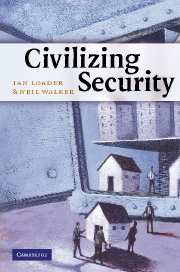1 - Uncivil security?
Published online by Cambridge University Press: 12 November 2009
Summary
Our argument in this book is that security is a valuable public good, a constitutive ingredient of the good society, and that the democratic state has a necessary and virtuous role to play in the production of this good. The state, and in particular the forms of public policing governed by it, is, we shall argue, indispensable to the task of fostering and sustaining liveable political communities in the contemporary world. It is, in the words of our title, pivotal to the project of civilizing security.
By invoking this phrase we have in mind two ideas, both of which we develop in the course of the book. The first, which is relatively familiar if not uncontroversial, is that security needs civilizing. States – even those that claim with some justification to be ‘liberal’ or ‘democratic’ – have a capacity when self-consciously pursuing a condition called ‘security’ to act in a fashion injurious to it. So too do non-state ‘security’ actors, a point we return to below and throughout the book. They proceed in ways that trample over the basic liberties of citizens; that forge security for some groups while imposing illegitimate burdens of insecurity upon others, or that extend the coercive reach of the state – and security discourse – over social and political life. As monopoly holders of the means of legitimate physical and symbolic violence, modern states possess a built-in, paradoxical tendency to undermine the very liberties and security they are constituted to protect.
- Type
- Chapter
- Information
- Civilizing Security , pp. 7 - 32Publisher: Cambridge University PressPrint publication year: 2007

